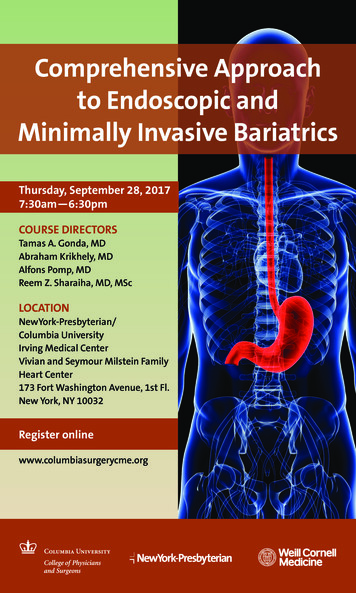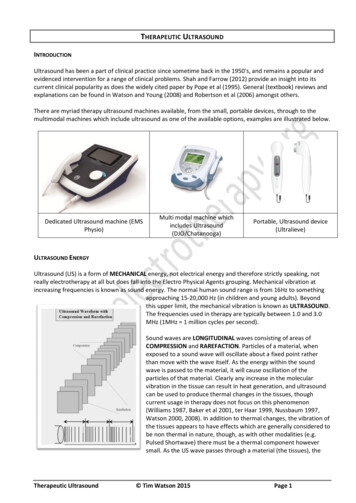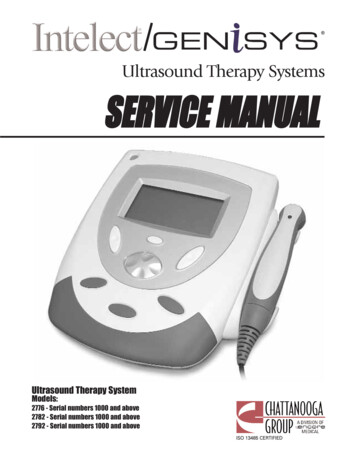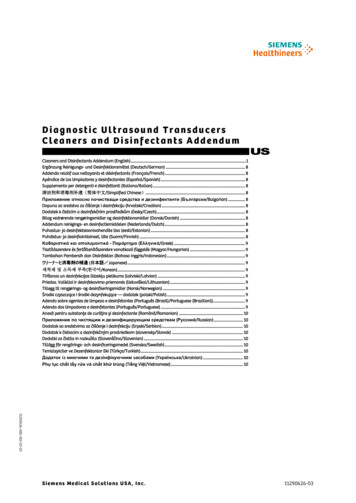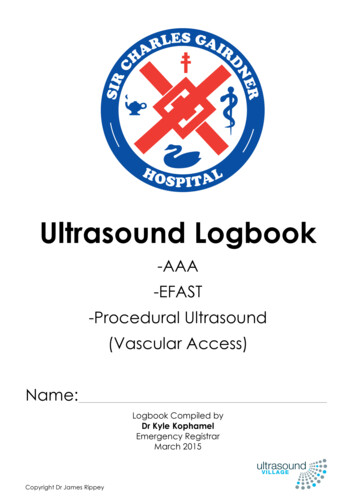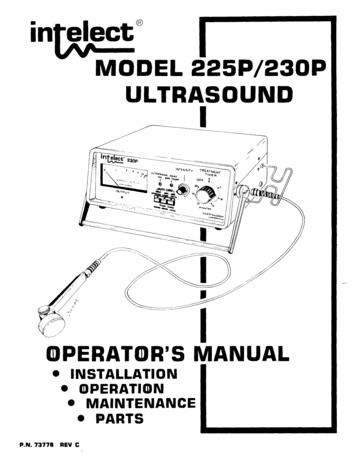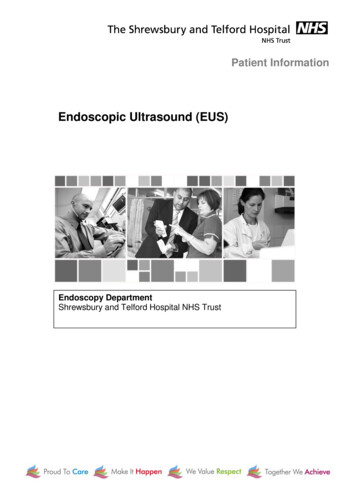
Transcription
Patient InformationEndoscopic Ultrasound (EUS)Endoscopy DepartmentShrewsbury and Telford Hospital NHS Trust
What is an Endoscopic Ultrasound (EUS)?Endoscopic Ultrasound plays a role in evaluating disorders of the oesophagus, stomach andsurrounding organs, including the pancreas and bile ducts; it also measures the thickness andspread of abnormalities in the oesophagus and stomach, or to assess a cancer that has alreadybeen found. EUS is an examination that combines endoscopy and ultrasound in order to obtainimages and information about the digestive tract and the surrounding tissue and organs using aflexible endoscope. An endoscope is a long flexible tube about the size of your little finger, with abright light at the end. It also has a small ultrasound transducer at the end that can send outsound waves allowing the doctor to examine and take pictures of your digestive system.In certain conditions EUS is also used to guide a special injection as treatment for severe pain,this is called a Coeliac Plexus Neurolysis (CPN) Biopsy: during the procedure tissue (biopsy) samples may be taken. This is sometimesreferred to as “fine needle aspiration” FNA .This means that a very small needle will beinserted through the flexible tube to sample cells in the unusual area of the oesophagus(food pipe), stomach, bowel or pancreas noticed in previous tests or x-ray. This is normallya painless procedure but it may cause some slight discomfort. Sometimes EUS can beused to take fluid samples.About your appointmentPlease be aware that on occasions there can be a slight delay between your nurse admission andthe time you have your procedure. The Endoscopy unit often has to deal with emergency caseswhich may cause delays to your appointment time. The length of time you will be here will vary butmay be anything from two to four hours. The person accompanying you is welcome to stay in ourwaiting area or alternatively we can telephone them when you are ready to be collected. Pleasenote car parking charges are in force. Ask your admitting nurse if you require any furtherinformation during your admission check.PropertyPlease do not bring valuables to the hospital. We cannot accept any responsibility for the loss ordamage to personal property during your time in the unit.Risks, benefits and alternativesWhat are the benefits?EUS allows a more detailed assessment of the tissue and surrounding organs. The ultrasoundcomponent allows us to obtain valuable information about these organs, which cannot be given byother tests.The purpose of the FNA / biopsy is to get tissue samples in order to make a specific diagnosis toplan further investigation and management Dependent on the results of this test, which could be normal or abnormal, furthertests or treatment maybe recommended.2
Are there any risks?As with every medical procedure, there are some risks involved. Please be reassured that yourdoctor would only have recommended EUS if the benefit to you from the procedure clearlyoutweighs these small risks. Any complications could mean you need to stay in hospital fortreatment. Diagnostic EUS carries a very small risk (1 in about 1,000 cases) of haemorrhage(bleeding) or perforation (tear) of the gut following which surgery may benecessary. The use of guided needle sampling slightly raises the risk of haemorrhage but therisk remains very slight. The risk of perforation is about 1 in 1,000 when using anendoscope to take samples with EUS. If FNA is performed on the pancreas, pancreatitis (inflammation of the pancreas)may occur. It is severe in about 1 in 100 procedures and you may requirehospitalisation. Reaction to any sedation or painkillers used. This can be resolved by the use ofother drugs. Damages: to dental bridgework, loose or crowned teeth.Severe complications are rare, but may require emergency surgery, blood transfusion or, inextremely rare circumstances, result in death.If you have a Coeliac Plexus Neurolysis (CPN) we will observe your blood pressure for a whileafter the procedure. CPN may temporarily lower your blood pressure, but this is very unusual.Some patients may have diarrhoea for a few days after the procedure. A very small number mayexperience a temporary increase in pain. A very rare complication that may occur is an abnormalheart beat (arrhythmia) which could potentially be serious. During the procedure we will monitoryour heart for signs of this.Are there any alternatives to an Endoscopic Ultrasound?You may or may not have had radiological scans; however they are not as detailed as thisexamination.Preparation for the procedureWhat preparation is required?DiabeticIf you are taking medication or insulin please follow the advice that is attached to yourappointment letter.Medication to thin your bloodIf you are taking any medication to thin your blood please follow the advice that is attached to yourappointment letter.Current medicationPlease bring a list of any current medication; you may resume your regular diet and medicationafter the procedure.3
Nil by mouthTo allow a clear view during the procedure the stomach must be empty. It is important that you donot have anything to eat for at least 6 hours prior to your appointment time. You may have sipsof water only for up to 2 hours prior to your appointment.PhotographsWe will take photographs during the procedure; these will be kept in your medical records.TrainingThe training of doctors and other health professionals is essential to the continuation of the NHS,and improving the quality of care. Shrewsbury and Telford Hospital’s Endoscopy Units are bothtraining units and sometimes deliver national training courses. All trainees are experienceddoctors or nurses and the procedure is performed under the direct supervision of an expertconsultant or nurse trainer. The trainer is there to ensure your safety and comfort.You can however, decline to be involved in the formal training of medical and other students;please inform the nursing staff on admission, this will not affect your care and treatment.PregnantPlease inform the unit prior to your appointment if you are pregnant.What happens when you arrive at hospital?On admissionAfter admission by reception staff a member of the nursing team will prepare you for yourprocedure. She will ask you some questions, including your medical history. The nurse is veryaware that you may be worried and anxious so do not be afraid to ask any questions.ConsentThe nurse will explain the procedure to you and discuss any potential risks related to theprocedure. You will have the opportunity to ask any further questions. You will be asked to signthe consent form by the Endoscopist confirming that you understand and agree to go ahead withthe procedure. You can change your mind about having the procedure at any time.The procedureWhat should I expect during the procedure? You will be collected and taken into the procedure room where the Endoscopistand the nurses will introduce themselves. You will have the opportunity to ask anyquestions. You may have your throat sprayed with a local anaesthetic before the procedurebegins. While you are lying comfortably on your left side the Endoscopist / nurse will placea needle into a vein.4
Sedation will be given through this needle to help you relax, but you will not becompletely asleep (this is not a general anaesthetic) for this procedure. The needlewill be removed prior to discharge. If you have any dentures, you will need to remove them at this point, any remainingteeth will be protected by a small plastic mouth guard which will be insertedimmediately before the examination commences. You will be given oxygen through small tubes into your nostril. In order to monitor your heart rate and breathing the nurse looking after you willclip a probe onto one of your fingers. The Endoscopist will introduce the gastroscope gently into your mouth, down yourgullet into your stomach. You may gag slightly; this is quite normal and will notinterfere with your breathing or swallowing. Your stomach will be gently inflated with air to expand it so that the lining can beseen clearly, which will make you burp and belch a little. Most of the air is takenout as the endoscope is removed. Any saliva produced will be removed with a small suction tube similar to that usedat the dentist. A nurse will be with you throughout your procedure giving you guidance andsupport. You may also choose to hold the hand of the nurse. The procedure can take from 30-90 minutes.After the procedureWhat happens afterwards?Once completed, the nurse caring for you during your procedure will take you to the recovery areawhere you will rest until fully recovered.Maintaining the privacy and dignity of our patients is important to us. The recovery area isdivided into separate areas for male and female patients.If you have had sedation you will be monitored until you are discharged home. You will be allowedto rest for as long as necessary.Discharge arrangementsWhat happens when I am ready for discharge?The nursing staff looking after you will speak with you prior to discharge. A report of theexamination will be given to yourself and a copy sent to your GP. If you have had sedation thiscan sometimes make you forgetful so please have someone with you at this discussion. Anaftercare sheet will be given to you prior to leaving the unit which will contain all relevantinformation. Biopsy results may take a number of weeks to be available. The numbing effect of5
the throat spray may last for one hour. After this period of time and when the numbness has wornoff, you will be able to eat and drink normally.Please remember: Sedation may affect your judgment and reflexes for the rest of the day;therefore it is important that you have a responsible adult to take you home following theprocedure and remain with you for the next 12 hours. You must not drive a vehicle, drink alcohol,operate any machinery, and sign any important or legal documents for 24 hours following yourprocedure.Contact details for more informationIf you are worried or have any questions please do not hesitate to contact the hospital where youhave been offered your appointment. Endoscopy Units Princess Royal Hospital, Telford Tel: 01952 565700 / 565701 Royal Shrewsbury HospitalTel: 01743 261064 / 492395Further information is available from; Patient Advise and Liaison Service (PALS)PALS will act on your behalf when handling patient and family concerns; they can also helpyou get support from other local or national agencies. PALS are a confidential service.Royal Shrewsbury HospitalPrincess Royal Hospital, TelfordTel: 01743 261000 Ext 1691Tel: 01952 641222 Ext 4382Useful website CORE - Digestive Disorders foundationProvides information leaflets on a wide range of digestive disorders. For patient informationleaflets, send a stamped addressed envelope stating any information you require to thefollowing address:Address:Telephone:Website: CORE, 3 St Andrews PlaceLONDON, NW1 4LB020 7486 0341 (this is not a helpline)www.corecharity.org.ukPatient UKProvides leaflets on health and disease translated into 11 other languages as well as links tonational support/self help groups and a directory of UK health websites.Website:www.patient.co.uk6
Disclaimer This leaflet is provided for your information only. It must not be used as a substitute forprofessional medical care by a qualified doctor or other health care professional. Alwayscheck with your doctor if you have any concerns about your condition or treatment. Thisleaflet aims to direct you to quality websites: these are correct and active at the time ofproduction. The Shrewsbury and Telford Hospital NHS Trust is not responsible or liable,directly or indirectly, for ANY form of damages whatsoever resulting from the use (or misuse)of information contained in this leaflet or found on web pages linked to by this leaflet.Website: www.sath.nhs.ukInformation Produced by: Endoscopy DepartmentDate of Publication: June 2005, Reviewed: - March 2007 August 2013 August 2015 February 2016Due for Review on: February 2019 SaTH NHS Trust7
If you have any dentures, you will need to remove them at this point, any remaining teeth will be protected by a small plastic mouth guard which will be inserted immediately before the examination commences. You will be given oxygen through small tubes into your nostril. In order to monitor your heart rate and breathing the nurse looking after you will clip a probe onto one of your fingers .


